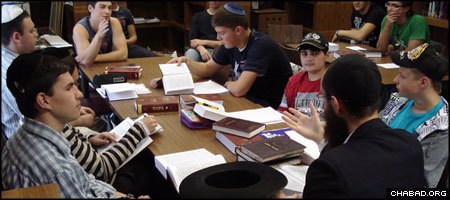In addition to the tens of thousands of people who have pledged to spread goodness and kindness throughout the world, and to take on a specific deed in the merit of those who perished last month in the Mumbai terror attacks, many organizations and communities have launched Torah study campaigns as a way to honor the deceased.
Soon after the tragedy – in which more than 170 people, including six at the central Mumbai Chabad House, were murdered – students throughout the Chabad-Lubavitch yeshiva system embarked on an unprecedented study cycle of Jewish law and Chasidic thought. Working in pairs, they divided up the Mishnah – a collection of rabbinical laws and enactments redacted in the second century C.E. – and its much-larger explanatory text known as the Talmud. They also studied the entire corpus of work penned by the Rebbe, Rabbi Menachem M. Schneerson, of righteous memory, who stressed in his teachings the importance of Jewish unity, especially in the face of tragedy. The material numbers hundreds of volumes, from the Rebbe’s public discourses and sermons to his collected letters.
Chabad-Lubavitch emissaries and their community members also signed up to several study programs after the tragedy.
While traditionally after the passing of a loved one, family and friends split up the study of the Mishnah or Talmud, the sheer size of these communal learning initiatives is, by all accounts, staggering. Some tractates of the Talmud will be studied 25 times or more, coordinators said.
Rabbi Chaim Leibtag, chief operating officer at the National Council of Young Israel, a network of Orthodox synagogues throughout the United States, said that his organization embarked on its own study of the Mishnah in the merit of the six who died at the Chabad House: its directors, Rabbi Gavriel and Rivka Holtzberg; kosher supervisors Rabbi Aryeh Leibish Teitelbaum and Rabbi Benzion Kruman; Israeli grandmother Yocheved Orpaz; and Mexican national Norma Shvarzblat Rabinovich.
“We respect and admire the work that Chabad does,” said Leibtag, who detailed that the campaign will conclude the Mishnah by the end of the first 30 days after the victims’ burial. “We were glued to our television screens, and prayed for [the Holtzbergs’ and others’] safety throughout the ordeal.
“Once we knew of their fate,” continued Leibtag, “we wondered what else we could do. Sure, you could give money and you could pray, but people also wanted to do more.”
Leibtag said that through the Internet, vast numbers of people joined in the effort.
By attacking the Chabad House, the terrorists “were targeting each and every one of us as Jews,” he stated. “And so the answer is that we all must come together.”
In addition to Young Israel, TheYeshivaWorld.com, a popular Web site that follows news of relevance to the Orthodox Jewish world, also launched a Mishnah study campaign. Another organization in London that sponsors quarterly Torah study sessions devoted its upcoming event to the memory of those murdered in Mumbai.
Countless other communal organizations and synagogues around the globe launched their own similar learning initiatives after the terror attacks.
Speaking at the Holtzbergs’ funeral earlier this month, Rabbi Avraham Shemtov, chairman of Agudas Chasidei Chabad, the worldwide umbrella of Chabad-Lubavitch, asserted a special power in the worldwide campaigns of study and doing good deeds.
“If 10 murderers can accomplish so much of their desire, how much more can b e accomplished when all of us who were so concerned about the outcome [in Mumbai] act together in the positive?” he asked. “There is so much that unites us, and absolutely nothing that divides us.”







Join the Discussion